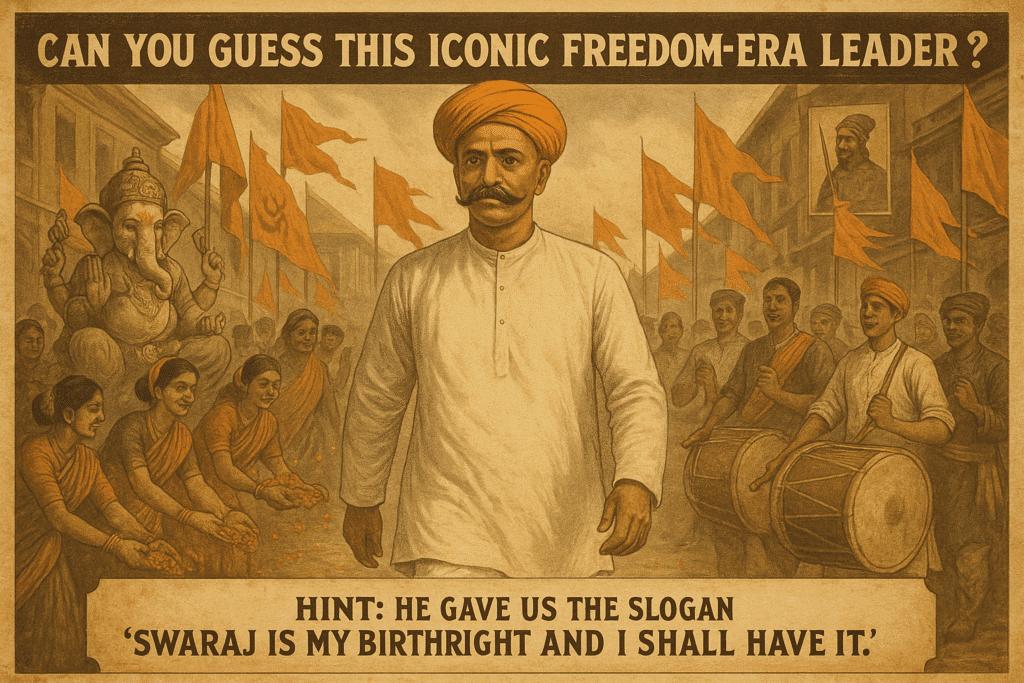Bal Gangadhar Tilak – Inspiring Legacy, UPSC Relevance & Coaching Insights
Bal Gangadhar Tilak: The Unyielding Father of Indian Nationalism and His Relevance in UPSC Preparation
Bal Gangadhar Tilak—popularly revered as Lokmanya Tilak—was one of the most influential leaders of India’s freedom movement. His bold nationalism, intellectual strength, and revolutionary spirit transformed Indian politics from moderate petitions to radical demands for Swaraj (self-rule). For UPSC aspirants, Tilak represents a crucial figure whose life bridges Modern Indian History, Political Thought, and Ethics, making him indispensable for Prelims, Mains, and Essay papers.
Early Life and Education
Birth and Family Background
Tilak was born on July 23, 1856, in Ratnagiri, Maharashtra, into a Chitpavan Brahmin family. His father, Gangadhar Tilak, was a Sanskrit scholar and teacher, instilling in him a love for classical learning and discipline.

Academic Journey and Early Influences
Tilak completed a B.A. in Mathematics (1877) from Deccan College, Pune, and later earned an L.L.B. (1879) from Government Law College, Bombay. Despite his academic brilliance, his disillusionment with British policies led him towards activism.
Role in Educational Institutions
Believing education was the key to awakening national spirit, Tilak co-founded:
Poona New English School (1880)
Deccan Education Society (1884)
Fergusson College (1885)
These institutions aimed to instill patriotism in youth—an aspect frequently discussed in UPSC essays on education and nationalism.
Role as Journalist and Social Reformer
Founding of Kesari and Mahratta
Tilak launched Kesari (Marathi) and Mahratta (English) to spread nationalist ideas. These papers gave voice to grievances against British policies, famine mismanagement, and social injustices.
Sedition Cases and Lokmanya Title
In 1897, after the murder of Commissioner Rand, Tilak was charged with sedition for his writings. His defiance earned him the title Lokmanya—beloved of the people.
Journalism and Ethical Nation-Building
Tilak’s writings represent media as a force of accountability—a theme often used in UPSC ethics case studies.
Political Ideology and the Extremist Shift
Entry into the Indian National Congress
Tilak joined the Congress in 1890 but soon challenged the moderate line of leaders like Gopal Krishna Gokhale.
Clash with Moderates and Surat Split (1907)
The Surat Session of 1907 marked a historic split—Tilak’s extremists vs. moderates—a frequent UPSC Prelims topic.
The Lal-Bal-Pal Trio
Along with Lala Lajpat Rai and Bipin Chandra Pal, Tilak formed a trio advocating direct action and mass mobilization.
Mass Mobilization and Religious Symbolism
Ganesh Chaturthi and Shivaji Jayanti as Tools of Unity
Tilak revived these festivals to foster cultural nationalism and mobilize people across caste and class lines.
Youth Engagement: Akhadas and Lathi Clubs
He encouraged physical training and collective spirit among youth, preparing them for activism.
Tilak and the Swadeshi Movement
Boycott of British Goods
In response to Bengal’s partition (1905), Tilak promoted Swadeshi goods and economic self-reliance.
Four-Point Program of Nationalism
He outlined:
Swadeshi
Boycott
National Education
Swarajya
This model inspired Gandhi’s later Non-Cooperation Movement.
Imprisonments and Literary Contributions
Trials and Sentences
Tilak faced multiple imprisonments, most famously in Mandalay Jail (1908-1914).
Gita Rahasya and National Philosophy
During imprisonment, he authored Gita Rahasya, interpreting the Bhagavad Gita as a call for selfless action and duty—a key UPSC Ethics reference.
Home Rule Movement and Last Years
Alliance with Annie Besant
In 1916, Tilak and Annie Besant launched the Home Rule Movement, demanding dominion status.
Impact on Gandhi and Nehru
This movement shaped the future course of Gandhian non-violent mass struggles.
Death and National Mourning
Tilak passed away on August 1, 1920, deeply mourned as “The Maker of Modern India” by Gandhi.
Social Views and Gender Perspectives
Tilak supported education but opposed reforms like the Age of Consent Bill (1891), showing a paradox between political radicalism and social conservatism—an important UPSC ethics and history discussion point.
Legacy and Impact on Indian Freedom Struggle
Dubbed “Father of Indian Unrest” by the British.
Elevated nationalism from elite petitions to mass resistance.
Inspired leaders across generations with his Swaraj mantra.
Key UPSC Snippets and Exam Themes
“Swaraj is my birthright, and I shall have it” – iconic assertion of freedom.
Surat Split (1907) – ideological divide within Congress.
Ganesh Chaturthi/Shivaji Jayanti – cultural nationalism.
Lal-Bal-Pal Trio – extremist nationalism.
Gita Rahasya – ethics and duty in politics.
Home Rule Movement – precursor to Gandhian mass struggles.
New Careers Academy: Coaching Insights
New Careers Academy (NCA) is a trusted institute for UPSC and NDA preparation.
Test Series: Exam-oriented, UPSC-standard practice sets.
Expert Faculty: Experienced mentors guiding aspirants.
Concise Notes: Focused study material for revisions.
Personalized Support: Motivational sessions, one-on-one doubt clearing.
Their discipline-oriented strategy makes them a valuable resource for aspirants tackling vast subjects like Modern Indian History.
FAQs on Bal Gangadhar Tilak for UPSC
Q1. Why is Tilak called Lokmanya?
Because his fearless writings and leadership made him the beloved leader of the masses.
Q2. What was his role in the Surat Split of 1907?
Tilak led the extremists who clashed with moderates over methods of achieving independence.
Q3. How did Tilak use festivals for political unity?
He revived Ganesh Chaturthi and Shivaji Jayanti to spread nationalist ideas among common people.
Q4. What is Gita Rahasya’s relevance in UPSC?
It connects spirituality with duty and action, useful in Ethics and Essay papers.
Q5. How did Tilak inspire Mahatma Gandhi?
Tilak’s ideas of Swaraj and mass mobilization influenced Gandhi’s non-cooperation approach.
Q6. Is Tilak’s ideology relevant for today’s UPSC essays?
Yes—topics on nationalism, leadership, culture, and ethics often cite Tilak’s methods.





